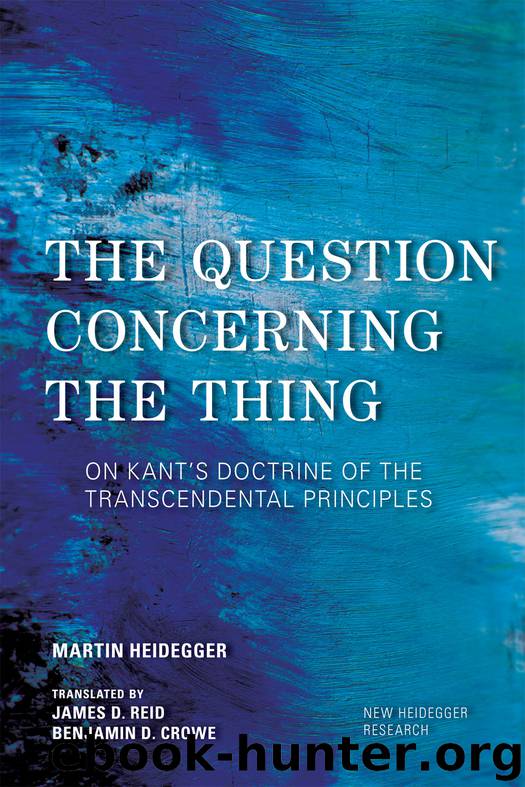The Question Concerning the Thing by Martin Heidegger

Author:Martin Heidegger
Language: eng
Format: epub
ISBN: 9781783484652
Publisher: Book Network Int'l Limited trading as NBN International (NBNi)
Published: 2018-10-10T16:00:00+00:00
§23. Interpretation of the Second Chapter of the [Second Book of the] Transcendental Analytic: “System of All Principles of Pure Understanding”
The choice of precisely this part of the entire work initially appears arbitrary. It can at least be justified in light of the fact that this chapter provides us with special insight with regard to our guiding question concerning the thingness of the thing. But even this remains at first an assertion. The question arises, whether precisely this section had special significance for Kant himself and for the way in which he grasped his own work, whether we speak for Kant himself when we call this section the center of the work. The answer to this question is “yes.” For in the establishment and unified grounding of this system of all principles of pure understanding, Kant secures a basis upon which the truth of the [127] knowledge of things is founded. In this way, Kant establishes and delimits a domain (critique) from which it can first be decided how things stand with the determination of the thing and the truth of prior metaphysics, whether the essence of truth is truly determined in it, whether a rigorously axiomatic, i.e., mathematical, knowledge unequivocally pursues its course within it, and thereby reaches its goal, or whether this rational metaphysics—as Kant himself says—is only a “groping about,” and indeed a groping about in “mere concepts,” without demonstration in the things themselves and consequently lacking justification and validity. The survey of pure reason with regard to metaphysics must at the same time assess [ab-messen] how metaphysics, i.e., in accordance with its definition, how the science of the foundations of human cognition, is possible. How do matters stand with human cognition and its truth?
(The following interpretation makes up for what was lacking in Kant and the Problem of Metaphysics [1929]; cf. the preface to the second edition, 1950. The title of this work is imprecise and hence easily leads to the misunderstanding that the “problem of metaphysics” concerns a problem the solution of which would entail the renunciation of metaphysics itself. “The problem of metaphysics” means rather the questionability of metaphysics as such.)
At the beginning of the chapter titled “On the Ground of the Distinction of All Objects in General into Phenomena and Noumena,” Kant provides a retrospective look at the second chapter, in which he treats the system of all principles (A235/B294). In an intuitive analogy he clarifies what was at issue in the establishment of the system of all principles of pure understanding: “We have now not only traveled through the land of pure understanding, and carefully inspected each part of it, but we have also surveyed it, and determined the place for each thing in it. But this land is an island, [128] and enclosed in unalterable boundaries by nature itself. It is the land of truth (enchanting name), surrounded by a wide and stormy ocean, the true seat of illusion, where many a fog bank and rapidly melting iceberg pretend to be
Download
This site does not store any files on its server. We only index and link to content provided by other sites. Please contact the content providers to delete copyright contents if any and email us, we'll remove relevant links or contents immediately.
| Automotive | Engineering |
| Transportation |
Whiskies Galore by Ian Buxton(41993)
Introduction to Aircraft Design (Cambridge Aerospace Series) by John P. Fielding(33116)
Small Unmanned Fixed-wing Aircraft Design by Andrew J. Keane Andras Sobester James P. Scanlan & András Sóbester & James P. Scanlan(32789)
Craft Beer for the Homebrewer by Michael Agnew(18235)
Turbulence by E. J. Noyes(8040)
The Complete Stick Figure Physics Tutorials by Allen Sarah(7362)
The Thirst by Nesbo Jo(6932)
Kaplan MCAT General Chemistry Review by Kaplan(6926)
Bad Blood by John Carreyrou(6611)
Modelling of Convective Heat and Mass Transfer in Rotating Flows by Igor V. Shevchuk(6432)
Learning SQL by Alan Beaulieu(6280)
Weapons of Math Destruction by Cathy O'Neil(6264)
Man-made Catastrophes and Risk Information Concealment by Dmitry Chernov & Didier Sornette(6004)
Digital Minimalism by Cal Newport;(5749)
Life 3.0: Being Human in the Age of Artificial Intelligence by Tegmark Max(5547)
iGen by Jean M. Twenge(5408)
Secrets of Antigravity Propulsion: Tesla, UFOs, and Classified Aerospace Technology by Ph.D. Paul A. Laviolette(5364)
Design of Trajectory Optimization Approach for Space Maneuver Vehicle Skip Entry Problems by Runqi Chai & Al Savvaris & Antonios Tsourdos & Senchun Chai(5063)
Pale Blue Dot by Carl Sagan(4996)
